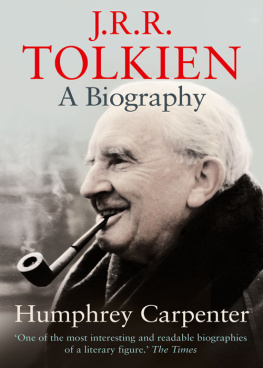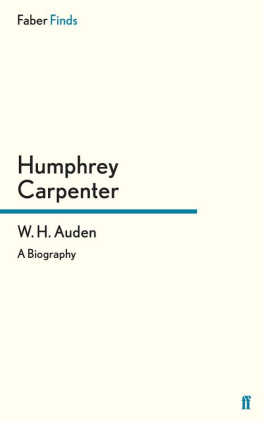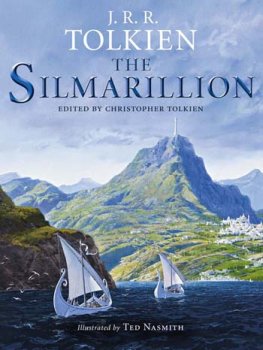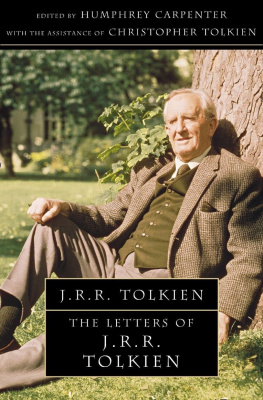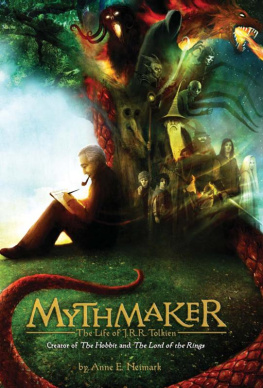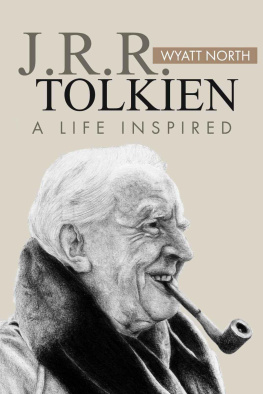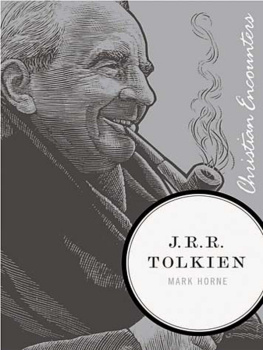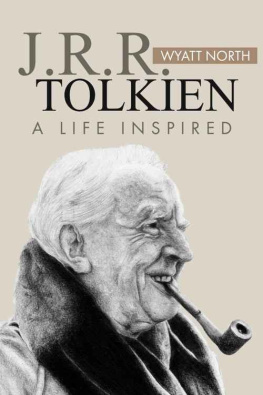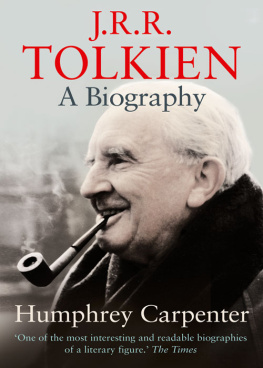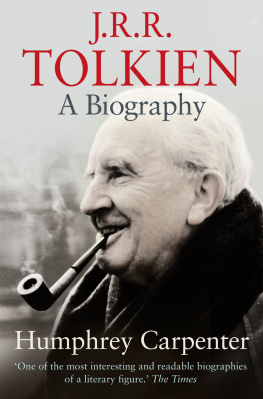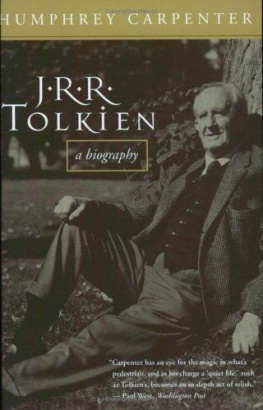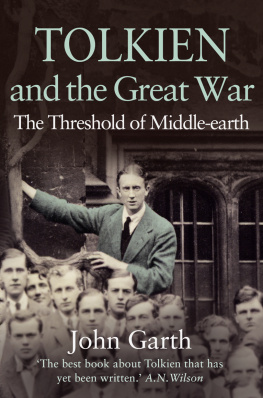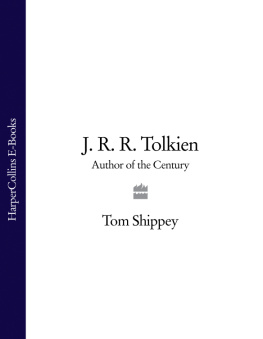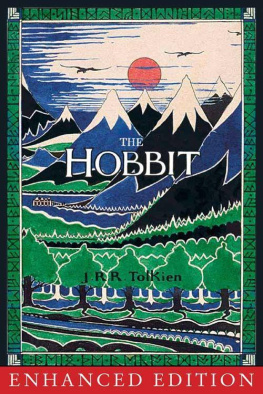
Dedicated to the memory of
The T.C.B.S.
Contents
It is mid-morning on a spring day in 1967. I have driven from the centre of Oxford, over Magdalen Bridge, along the London road, and up a hill into the respectable but dull suburb of Headington. Near a large private school for girls I turn left into Sandfield Road, a residential street of two-storey brick houses, each with its tidy front garden.
Number seventy-six is a long way down the road. The house is painted white and is partially screened by a tall fence, a hedge, and overhanging trees. I park the car, open the arched gate, go up the short path between rose bushes, and ring the front door bell.
For a long time there is silence, except for the rumble of distant traffic in the main road. I am beginning to think of ringing again or of turning away when the door is opened by Professor Tolkien.
He is slightly smaller than I expected. Tallness is a quality of which he makes much in his books, so it is a little surprising to see that he himself is slightly less than the average height not much, but just enough to be noticeable. I introduce myself, and (since I made this appointment in advance and am expected) the quizzical and somewhat defensive look that first met me is replaced by a smile. A hand is offered and my own is firmly grasped.
Behind him I can see the entrance-hall, which is small and tidy and contains nothing that one would not expect in the house of a middle-class elderly couple. W. H. Auden, in an injudicious remark quoted in the newspapers, has called the house hideous, but that is nonsense. It is simply ordinary and suburban.
Mrs Tolkien appears for a moment, to greet me. She is smaller than her husband, a neat old lady with white hair bound close to her head, and dark eyebrows. Pleasantries are exchanged, and then the Professor comes out of the front door and takes me into his office at the side of the house.
This proves to be the garage, long abandoned by any car he explains that he has not had a car since the beginning of the Second World War and, since his retirement, made habitable and given over to the housing of books and papers formerly kept in his college room. The shelves are crammed with dictionaries, works on etymology and philology, and editions of texts in many languages, predominant among which are Old and Middle English and Old Norse; but there is also a section devoted to translations of The Lord of the Rings into Polish, Dutch, Danish, Swedish, and Japanese; and the map of his invented Middle-earth is pinned to the window-ledge. On the floor is a very old portmanteau full of letters, and on the desk are ink-bottles, nibs and pen-holders, and two typewriters. The room smells of books and tobacco smoke.
It is not very comfortable, and the Professor apologises for receiving me here, but he explains that there is no space in the study-bedroom in the house where he actually does his writing. He says that in any case this is all temporary: soon he will, he hopes manage to finish at least the major part of the work promised to his publishers, and then he and Mrs Tolkien will be able to move to more comfortable quarters and congenial surroundings, away from visitors and intrusions. He looks slightly embarrassed after the last remark.
I climb past the electric fire and, at his bidding, seat myself in a wheel-back chair, as he takes his pipe from the pocket of his tweed jacket and launches into an explanation of his inability to spare me more than a few minutes. A shiny blue alarm clock ticks noisily across the room as if to emphasise the point. He says that he has to clear up an apparent contradiction in a passage of The Lord of the Rings that has been pointed out in a letter from a reader; the matter requires his urgent consideration as a revised edition of the book is about to go to press. He explains it all in great detail, talking about his book not as a work of fiction but as a chronicle of actual events; he seems to see himself not as an author who has made a slight error that must now be corrected or explained away, but as a historian who must cast light on an obscurity in a historical document.
Disconcertingly, he seems to think that I know the book as well as he does. I have read it many times, but he is talking about details that mean little or nothing to me. I begin to fear that he will throw some penetrating question at me that will reveal my ignorance and indeed now he does ask me a question, but fortunately it is rhetorical and clearly requires no more than the answer yes.
I am still nervous that there will be other and harder questions, doubly nervous because I cannot hear everything that he is saying. He has a strange voice, deep but without resonance, entirely English but with some quality in it that I cannot define, as if he had come from another age or civilisation. Yet for much of the time he does not speak clearly. Words come out in eager rushes. Whole phrases are elided or compressed in the haste of emphasis. Often his hand comes up and grasps his mouth, which makes it even harder to hear him. He speaks in complex sentences, scarcely hesitating but then there comes a long pause in which I am surely expected to reply. Reply to what? If there was a question, I did not understand it. Suddenly he resumes (never having finished his sentence) and now he reaches an emphatic conclusion. As he does so, he jams his pipe between his teeth, speaks on through clenched jaws, and strikes a match just as the full stop is reached.
Again I struggle to think of an intelligent remark, and again he resumes before I can find one. Following some slender connecting thread, he begins to talk about a remark in a newspaper that has made him angry. Now I feel that I can contribute a little, and I say something that I hope sounds intelligent. He listens with courteous interest, and answers me at some length, turning my remark (which was really very trivial) to excellent use, and so making me feel that I have said something worth saying. Then he is off on some tangential topic, and I am once more out of my depth, able to contribute no more than a monosyllable of agreement here and there; though it does occur to me that I am perhaps valued just as much as a listener as a participant in the conversation.
As he talks he moves unceasingly, pacing about the dark little room with an energy that hints at restlessness. He waves his pipe in the air, knocks it out in an ashtray, fills it, strikes a match, but scarcely ever smokes for more than a few puffs. He has small, neat, wrinkled hands, with a plain wedding-ring on the third finger of the left hand. His clothes are a little rumpled, but they sit well on him, and though he is in his seventy-sixth year there is only a suggestion of tubbiness behind the buttons of his coloured waistcoat. I cannot for long keep my attention from his eyes, which may wander about the room or stare out of the window, yet now and then will return to dart a glance at me or rest a steady gaze as some vital point is made. They are surrounded by wrinkles and folds that change with and emphasise each mood.
The flood of words has dried up for a moment and the pipe is being lit again. I perceive my opportunity, and state my business, which now seems unimportant. Yet he turns to it immediately with enthusiasm, and listens to me attentively. Then, when this part of the conversation is done, I get up to go; but for the moment my departure is evidently neither expected nor desired, for he has started to talk again. Once more he refers to his own mythology. His eyes fix on some distant object, and he seems to have forgotten that I am there as he clutches his pipe and speaks through its stem. It occurs to me that in all externals he resembles the archetypal Oxford don, at times even the stage
Next page
